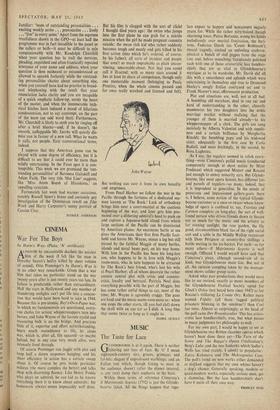CINEMA War For The Boys
In Harm's Way. (Plaza, 'A' certificate).
AALTHouati by uncountable decibels the noisiest film of the week (I felt like the man in Dorothy Sayers's belfry killed by sheer volume of sound), Otto Preminger's In Harm's Way is in no other way remarkable. Given that a war film that takes no particular stand on the war twenty years after is just twenty years too late, its failure is predictable rather than extraordinary. Half the stars in Hollywood and any number of thundering seafights can't put life into a concoc- tion that would have been hard to take in 1944. Because this is pre-atomic, Boy's-Own-Paper war, in which no fundamentals are questioned, every- one chafes for action, whippersnappers turn into heroes, and John Wayne of the laconic eyelid and reassuring bulk is on the bridge. And precious little of it, expertise and effort notwithstanding, bears much resemblance to life, let alone war, which is, after all, life squared—or maybe halved, but in any case very much alive, very Intensely lived through.
Of course Preminger can juggle with plot and keep half a dozen suspenses hanging; and his sheer efficiency in action has a certain sweep about it. Of course he gets inside particular milieux (the more complex the better) and talks shop with disarming fluency. Like Henry Fonda who plays an admiral, he can kid us he knows everything there is to know about admirals: his homework always seems impeccably well done. But his film is clogged with the sort of clichd I thought died years ago: the swine who jumps into the first plane he can grab for a suicide mission when the girl he made pregnant commits suicide; the mean rich kid who rather suddenly becomes tough and manly and gets killed in his first action (into which he's ordered, of course, by his father); all sorts of incident and people that aren't so much improbable as plain uncon- vincing, uncareable-about. Not that you could call it ill-acted; with so many stars around it has at least its share of competence, though only one memorable moment (belonging to Paula Prentiss,' when the whole cinema paused and for once really watched and listened and felt).
But nothing can save it from its own banality and emptiness.
From Pearl Harbor we follow the war in the Pacific through the fortunes of a dedicated sea- man known as 'The Rock.' Lack of orthodoxy brings him near a court-martial at the cautious beginning of the war, and later gets him pro- moted over a dithering admiral's head to push on and capture a Japanese-held island from which large sections of the Pacific can be dominated by American planes. An enormous battle at sea gives the Americans their first firm Pacific foot- hold and leaves Mr. Wayne, minus a leg but still nursed by the faithful Maggie of many battles, islands and naval bases past, on his way home. With him in the Pacific has been his long-lost son, who happens to be in love with Maggie's room-mate, who in turn happens to be attracted by The Rock's best friend, who's lost his wife at Pearl Harbor; all of whom decorate the rather austere central plot with crisis and counter- crisis, loyalty and betrayal. Patricia Neal does everything possible with the part of Maggie, but has some rather awful things to say, most of the time; Mr. Wayne is agreeably craggy. The guns arc loud and the music seems even more so: when one stops the other starts, till you feel cleft down the skull with an axe (or so I did). A long film that seems twice as long as it ought to.
ISABEL QUIGLY






























 Previous page
Previous page